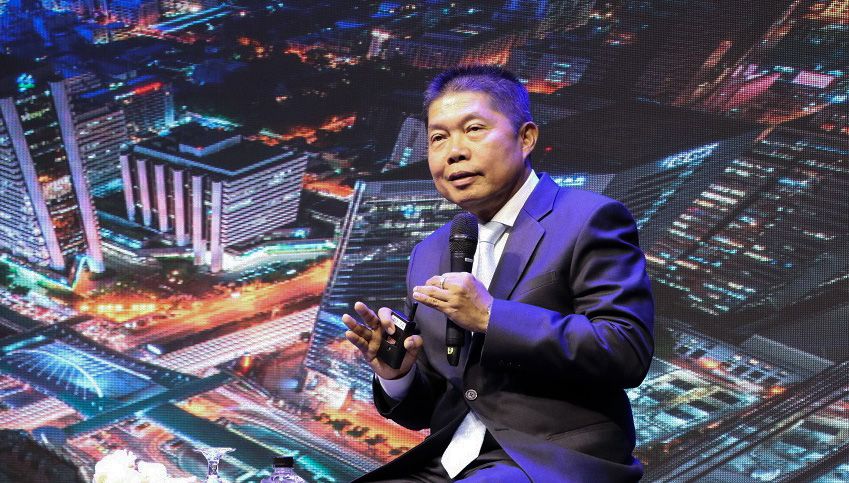Bangkok’s plan for the silver generation
By Nurfilzah Rohaidi
Interview with Deputy Governor Thaweesak Lertprapan.

While people usually seek a safe and comfortable place when they are ill, just trying to get to a hospital in Bangkok could be unsafe. “Sometimes patients have difficulty going to hospital,” Thaweesak Lertprapan says. It only gets more difficult for elderly patients who might not be able to travel on their own and must endure long traffic jams to make it to their appointments.
The Bangkok Metropolitan Administration (BMA) is using technology so the elderly can have more convenient access to healthcare. Lertprapan shares the city’s plans to provide home care for the elderly; improve tech in public hospitals; and work on cutting traffic jams.
From hospitals to homes
Tech is central to how Bangkok will support its ageing population. As with many other cities around the region and the world, the city is seeing more elderly, and a declining birth rate every year. As of 2018, 16% of Bangkok's registered 10 million people are aged 60 or over, the Bangkok Post reports.
One solution is to bring care to their homes - Bangkok’s long traffic jams make hospital visits unpleasant. The rising elderly population is also increasing the burden on the city’s working population as people must juggle full-time jobs with caring for their elderly relatives, according to a World Bank report.
The Bangkok government has set up a new unit - Home Ward Referral Centre - that sends healthcare staff and volunteers to check on elderly and disabled patients. Doctors and nurses share patient data from these home visits with hospitals so that they can better coordinate care for the elderly. “The hospital is going to know about it and can track the records,” he says.
The shared health records improves the patients’ experience. When the unit’s 2,400 staff, including doctors, nurses and drivers, are assigned to make home visits, they will have access to updates from the previous appointments. When the staff visits the home, they will use all these data and have real-time updates,” he explains. The vision is that patients don’t have to repeatedly provide the same information to doctors - whether at home visits or at hospitals.
Meanwhile, other cities in Thailand are ahead in trialling remote care for elderly patients. In 2016, Saensuk city became the first in the country to pilot a healthcare monitoring system for the elderly, made up of smart devices and sensors installed in homes.
Tech in public hospitals
The tech changes will carry on within hospitals too. The city government has launched a pilot to introduce electronic patient records in 10 public hospitals. This is a crucial platform required for the city’s public health system to use more advanced technologies like analytics and artificial intelligence in the future. "Because these 10 hospitals are under the control of BMA, it has the potential to succeed."
Public hospitals have lagged behind the city’s private sector ones. Private hospitals such as Bumrungrad International use advanced technologies, like 3D mapping for imaging tests and personalising care based on patients’ history. These hospitals have attracted medical tourists, and the city is on of the leading destinations for international patients in Asia. “In a private hospital, they can do it easily because the shareholders control everything.”
The governments wants to take advantage of their expertise by link patient record systems across public and private sector hospitals in the future. “We [will] talk to other agencies, private hospitals to join. It's like a pilot.”
And to make hospital visits less taxing for the elderly, they are now given priority in nine hospitals. Crowded waiting rooms and long queues are common at every public hospital, according to media reports. The governments is now guaranteeing that elderly patients will not have to wait for more than an hour in nine out of the city’s 10 public hospitals, the Bangkok Post reported.
Smart and connected city
Beyond healthcare, BMA wants to pull information from all over the city and manage it better, particularly to cut traffic congestion. “Bangkok invests in a lot of CCTVs, and also a lot of sensors around the speed,” Lertprapan says. There are currently 50,000 cameras across the city - as a comparison, the city of Yangon in Myanmar, which has a similar population density, has approximately 288 cameras used for traffic.
“The important thing, the focus is about big data, because we have information across the city.”The city monitors speeds at 400 public intersections, and shares its data with relevant parties, he continues. “The important thing, the focus is about big data, because we have information across the city,” the Deputy Governor says.
Transport infrastructure is managed by a number of public agencies such as the police, and the private companies that own tollways and expressways. The government wants to analyse data from across its CCTV cameras and share insights with them to improve coordination. “There are many stakeholder agencies involved in traffic problems - for example, police and private company who own the tollway, expressway. What BMA can do is provide them with information, insights,” Lertprapan explains.
For Bangkok, the problems that attract most attention are those to do with traffic congestion, flooding and lack of green spaces - some of which the city is already using data and sensors to tackle. But as the elderly rise in numbers, Bangkok must also find ways to make sure they can spend their twilight years in comfort.